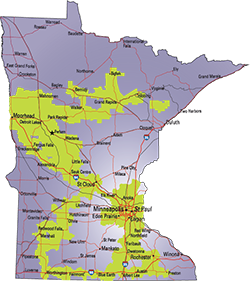 Minnesota-based regional carrier Arvig said today that during the first quarter of 2018, more than 30 schools or school districts chose the company to provide high-speed internet, transport and voice services funded, in part, through the Universal Service Fund (USF) E-rate program, also known as the schools and libraries program. The company’s success is an example of broader rural carrier E-rate opportunities.
Minnesota-based regional carrier Arvig said today that during the first quarter of 2018, more than 30 schools or school districts chose the company to provide high-speed internet, transport and voice services funded, in part, through the Universal Service Fund (USF) E-rate program, also known as the schools and libraries program. The company’s success is an example of broader rural carrier E-rate opportunities.
“We have found that more schools continue to become more aware of E-rate funding opportunities and processes,” said Mike Miller, Arvig sales manager, in an email to Telecompetitor in response to questions that we posed. “It’s really a win-win situation when all parties are more aware – the schools become more proactive with their applications, and we can spend more time focusing on bidding these opportunities. “
Arvig Business offers schools the option of purchasing traditional lit services, dark fiber or their own private network, the company noted in a press release.
Rural Carrier E-rate Opportunities
Some of Arvig’s wins have been in metro areas of Minnesota, including the Twin Cities. Arvig attributes the wins, in part, to the company being the only traditional telecom carrier in the Twin Cities metro area that offers fiber route location services and maintenance services to E-rate customers. The company has its own construction team, providing another differentiator.
Miller noted that each year has a relatively short E-rate season. “There is a small window of time for the schools and for the providers to get all the paperwork completed and filed,” he noted.
Arvig learns from previous years and shares that knowledge with the schools, Miller said.
“We want to make sure they are taking advantage of any type of additional funding to help them obtain the services they need for their staff and students,” he commented.

Miller’s advice for other rural carriers wanting to pursue E-rate opportunities?
“Having a dedicated salesperson or sales force to work this vertical market is helpful for sure,” he said. “They should be reaching out to consultants, which the schools regularly use to help make sure they’re compliant and to also provide ideas and suggestions for network builds. The sales team should also work directly with the schools to find out how they can help with the application process.”
As Arvig deploys fiber to support schools and libraries, the carrier also experiences some spillover benefits, Miller noted.
“Deploying fiber to a school may lead to other opportunities since we may pass by other organizations looking to upgrade/connect to our network,” he said.
Arvig signaled that it was taking the education market very seriously when it purchased AGL Consulting Services, a consultancy specializing in the education market, in 2016.


